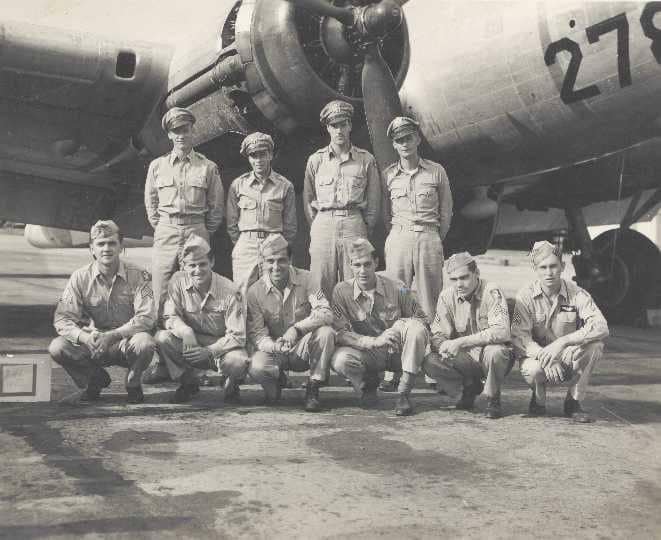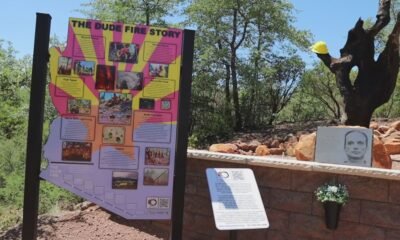Christmas
Celebrating 80 Years of a Grandfather’s Lasting Legacy

On Christmas Eve 1944, David MacHauer, a 20-year-old law student from Loyola New Orleans, found himself on a B-17 bomber named the “Miss Bea Havin’,” flying at roughly 25,000 feet over enemy territory near the Germany-Belgium border. As he manned two machine guns secured in a cramped ball turret, a tense intercom call alerted him of incoming enemy aircraft.
Initially hoping the approaching planes were American escorts, MacHauer’s optimism faded when enemy cannon fire erupted. B-17 bombers typically relied on smaller fighter planes for protection, but thick fog had delayed the escort mission that day. The attack came as a devastating surprise.
As he fired back at the German fighters, a sudden impact jolted him. His war diary later described the moment as the convergence of fate and his previous decisions. MacHauer’s position in the ball turret — a spherical, confined space at the bottom of the aircraft — greatly increased his vulnerability. The absence of a chest-worn parachute added to his peril, forcing him to rely on his crew for any emergency exit.
In the week leading up to the mission, weather grounded the U.S. 8th Air Force, allowing enemy forces to launch their final counteroffensive, known as the Battle of the Bulge. As allied losses mounted, MacHauer’s unit finally received orders to bomb an airfield near Frankfurt, marking his 17th mission.
Before takeoff, MacHauer made three significant changes to his gear. He opted for a backpack parachute, loaded his .45-caliber pistol, and switched to a chest holster, placing the loaded firearm directly over his heart. These seemingly minor decisions would prove to be lifesaving.
When enemy fire struck the Miss Bea Havin’, a 20 mm shell fragment tore through the aircraft and his left boot, but it harmlessly ricocheted off his pistol instead of penetrating his heart. Despite this, MacHauer believed he was gravely injured and attempted to call for help, but communication was lost, leaving him in an agonizing predicament.
As flames engulfed the bomber, MacHauer transitioned from despair to action. He maneuvered the turret hatch to fall out of the burning plane, battling flames as he exited. Thankfully, he activated his parachute and floated safely downward, benefiting from a headwind that carried him back toward allied territory.
Upon landing in an open field, American troops helped him reach a field hospital. There, he discovered the metal fragments of his pistol, which had saved his life. During his recovery, he learned about the losses sustained by his fellow crew members — a harsh reminder of the day’s tragedy.
The incident sparked attention among war correspondents, leading to misreported details about MacHauer being the sole survivor. In the following days, other members of his squadron returned, but four remained unaccounted for. MacHauer was eventually awarded a Purple Heart and went on to fly another 16 missions before returning home in 1945.
Remarkably, MacHauer’s story did not end with the war. Transitioning into a political career, he was elected to the Louisiana Senate and became a prominent voice against racial segregation in the face of national tension. His opposition to the 1954 Louisiana segregation bill exhibited not only personal courage but also marked him as a progressive figure within the political landscape of the time.
MacHauer firmly stated that supporting segregation was immoral and unjust, earning both applause and derision. His outspoken stance on civil rights earned him a reputation as a principled individual, one who would not compromise his beliefs for popularity.
MacHauer’s political legacy continued to unfold as he championed government transparency and criminal justice reforms throughout his career as a senator and later as a city traffic court judge. Despite facing backlash, he remained a steadfast advocate for equality and reform.
Recently, the 80th anniversary of MacHauer’s brush with death has prompted reflective research into his life and his subsequent impact on Louisiana’s socio-political landscape. What began as a harrowing experience in the skies above Belgium evolved into a legacy of courage and principle on the ground.
The remembrance of David MacHauer serves as a testament to the remarkable resilience of those who confront adversity with courage, both in warfare and in the fight for justice.


















